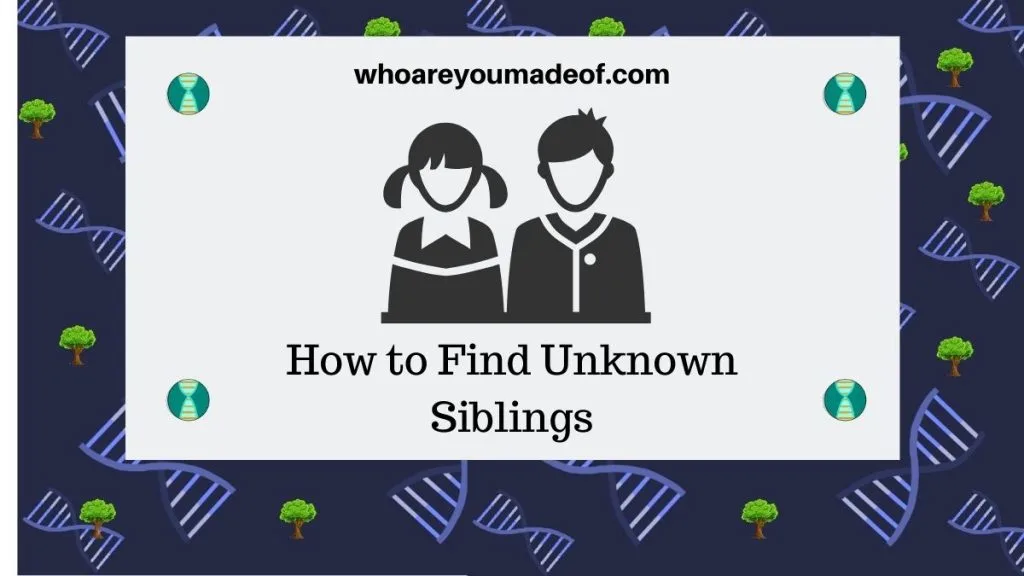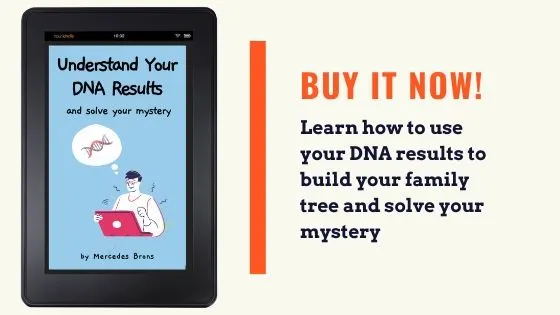Are you wondering how to find unknown siblings, even if you don’t know their names? In this post, learn the answer, as well as top tips for finding siblings you don’t know.
There are many reasons why a person might want to search for unknown siblings. A person who was adopted, for example, might be interested in locating siblings.

Other people might have been told by a relative, or even one of their parents, that they have half-siblings. Many people feel a deep need to locate their unknown siblings, to at least know about them and possibly initiate a relationship.
No matter the specific reason that you have decided to search for unknown siblings, I hope that the tips in this article help you in your journey.
Top tips for finding unknown siblings
Some of the below tips might not apply to your exact situation. The purpose of the list is to give you some ideas as to what you might be able to do in order to find siblings that you know might be out there somewhere.
If you don’t feel like one of the suggestions below applies to you, please feel free to ignore it. Only use the tips that you feel are appropriate in your circumstances.
Take a DNA test
One of the first recommended steps for finding unknown siblings is to take an autosomal DNA test, like the one offered by Ancestry DNA or 23andMe. Many more than 20 million people have tested their DNA over the past several years.
If your sibling, or another close relative, has taken a DNA test, they will show up as a DNA match to you. A DNA match is a person who shares some of their DNA with you.
Our list of DNA matches, or genetic relatives, is one of the most effective ways to locate biological family, including full and half-siblings and other close family members.
Upload your DNA results to as many websites as possible
Once you receive your DNA results, you are able to download your data and upload it to several other DNA testing companies. This is a great way to find DNA matches, including potential siblings, who may have tested their DNA with other companies.
The reason that you should consider uploading your DNA data from your testing company to another site is because our DNA testing company can typically only provide us with a DNA match list that includes people who also did a DNA test with the same company.
Uploading our data into other databases allows our DNA to be compared with customers who tested with other companies, potentially helping us find those relatives we are looking for.
Take additional DNA tests with other companies
There are a few DNA testing companies that don’t allow you to upload your DNA data from other companies. For example, 23andMe and Ancestry DNA do not allow uploads.
In order to access their database to allow your DNA to be compared with that of their other customers, you will need to test your DNA directly with them.
It is high recommended to take either the 23andMe or Ancestry DNA test. If you are able to take both of the tests, your DNA will be compared with the vast majority of people in the United States who have tested their DNA.
Contact your state
If you were adopted as a child, then you may be able to contact your state in order to obtain records related to your adoption. Laws vary by state, but you might be able to obtain detailed information pertaining to your biological parents, as well as circumstances surrounding your adoption.
This is exactly how one of my relatives learned that they had an older brother. Paperwork provided by the state, at the request of my cousin, provided extensive details about an older sibling.
After learning about the existence of an older sibling, my cousin was able to locate them through DNA results, since they had tested with 23andMe. DNA testing also connected my cousin with me, and I was able to relate family stories and share family tree information with them.
Find and register with adoption registries
There are many private and state-operated adoption agencies that exist in order to help those who were adopted connect with their biological relatives.
In some states, such as New York, biological parents can provide the state with a release, essentially giving the state registry permission to provide identifying information to the person who was adopted.
Privately run adoption search registries are numerous. You can see a very long list of places to search here: Online Adoption Search Registries
Learn how to do genealogy research
Genealogy research strategies can help you learn a lot about your known relatives. The details you learn through your genealogy research can provide clues about your parents that could potentially lead to the discovery of siblings.
In addition, genealogy research can help you discover other relatives with whom you could potentially speak in order to learn more about your immediate family.
Talk to older known relatives
Older relatives, such as aunts, uncles, grandparents, and cousins, can provide a lot of context for learning about our parents’ lives. Sometimes, older relatives know stories about our parents that they might not have shared with us.
If you have the ability to speak with close relatives of either of your biological parents, they may be able to shed some light on whether it is possible that you have siblings.
Take advantage of social media
If you know the names of your biological mother or father, you might be able to locate siblings on social media. People often create their social media profiles using their full names and locations, and sometimes even have their relatives on their list of connections.
Research your birth parents
By learning as much as you can about your mother and father, you can learn details that could help you decide where you should look for siblings. Information such as where the went to college, where they were stationed in the military, or the names of their siblings found on a census record, could provide just the information that you need.
Talk to your birth parents
If you are able to speak with either your biological mother or father, you might be able to learn about whether they believe that you have siblings. While this option isn’t available for everyone, you could consider having this discussion, if it applies to you.
Reach out to close DNA relatives
If you have taken a DNA test, you likely have several people on your DNA match list that are related to you at a third cousin distance or closer. By contacting your DNA matches, you might be able to learn more about your immediate biological family – and discover whether those relatives believe you may have siblings.
Conclusion
I hope that this post helped you learn more about the various ways that you might be able to find unknown siblings, and sometimes even do it for free. If you have ideas and suggestions of your own that are positive and encouraging, I would love for you to post them in the comments below.
Thank you for stopping by today!


aydrus
Sunday 11th of February 2024
I want talk about how to get the lab to Africa if you can help